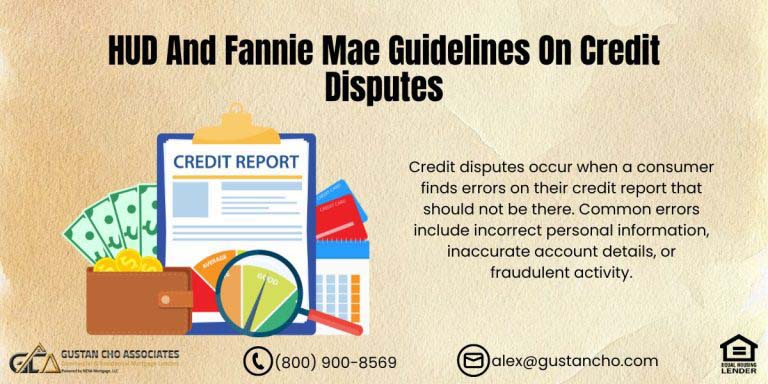This guide covers excluding debts from co-signed loans to qualify for mortgage loans. Mortgage borrowers who are co-signers on debts often have a hard time qualifying for mortgage loans because the monthly payments of the main borrower are included in the calculations of their debt-to-income ratios.
John Strange, a senior loan officer at Gustan Cho Associates, explains about excluding debts from co-signed loans so the co-signer can qualify for a mortgage loan as follows:
There are ways of excluding debts from co-signed loans. But they are strict, and a mortgage loan originator planning to exclude debts from co-signed loans must carefully examine the payment history. The loan officer needs to determine how the debts are paid monthly by the main borrower and see the paper trail for the past 12 months.
The main borrower needs to prove that he or she has been making timely payments for the past 12 months with a bank check or online via online payment. Cannot have the main borrower be late on any payments in the past 12 months, or the deal is off. You cannot exclude debts from con-signed loans if there has been one late payment.
Borrowers who paid cash on co-signed loans cannot have the debts of the co-signer excluded from co-signed loans. Cash payments do not count. All monthly payments will need to be documented. In the following paragraphs, we will discuss excluding debts from co-signed loans from co-signers so they can qualify for a mortgage loan.
Does Co-Signing Count as Debt?
By co-signing a loan, you assume the legal obligation of repaying the loan if the primary borrower cannot. This means that co-signing the loan is considered a part of your debt. This affects your financial profile in several ways. When you take on more loans, it can lead to an increase in your debt-to-income ratio (DTI).
Lenders use your DTI as a crucial measure to determine whether you can take on new loans. A higher DTI can make it challenging for you to obtain additional credit, such as a mortgage. This is because it indicates a greater likelihood of default and represents a higher risk.
Co-signing has the potential to impact your credit utilization ratio. This ratio shows the amount of credit you use for your credit limits. If your credit utilization is high, it can negatively affect your credit score.
Moreover, the payment history on the co-signed loan directly influences your credit score. Your credit score could decrease if the primary borrower needs to be on time on payments or defaults. Conversely, consistent, on-time payments can improve your score. Therefore, co-signing a loan is a significant financial responsibility with real implications for your creditworthiness and should be considered carefully.
Co-Signed a Loan? You May Still Qualify for a Mortgage
Lenders can exclude co-signed debt—if the right documentation is in place. Get the loan you deserve
Does Cosigning a Loan Affect Getting a Mortgage?
It’s important to consider the impact of cosigning a loan on your ability to obtain a mortgage. It is important to comprehend that you will be held accountable for the debt if the primary borrower defaults. This also means that the loan will be factored into your overall debt.
This inclusion increases your debt-to-income (DTI) ratio, a critical factor that lenders evaluate when deciding on mortgage applications. A higher DTI ratio can make it more difficult to secure a mortgage or to obtain favorable loan terms. Your credit score may be adversely affected if the borrower fails to make timely payments.
However, consistent payments can have a positive impact. However, the increased debt burden could still lower your credit score by affecting your credit utilization ratio. Cosigning also reduces your overall borrowing capacity, as lenders view the cosigned loan as a potential future liability, making it tougher to qualify for a mortgage.
This can also lead to a more complicated and prolonged mortgage approval process, as lenders might require extra documentation to ensure you can manage the additional debt. Considering these factors, it’s wise to consult with a financial advisor to fully understand how cosigning could affect your financial plans, especially if you intend to apply for a mortgage.
Examples Of Excluding Debts From Co-Signed Loans To Qualify For Mortgage
Often, a parent may help a child get an auto loan but will not be listed as a co-borrower. They are just the borrower. The child may pay the auto loan payments for over 12 months. With this type of case scenario, this is what happens. Even though the child has proof of paying timely auto loan payments and the insurance card is in their name, they can provide 12 months of canceled checks.
Regarding the canceled checks, the child has been making the payments directly to the automobile finance company, is up to the lender whether the lender will exempt the debt. Most lenders cannot exclude this debt from the main borrower’s debt-to-income ratios.
However, Gustan Cho Associates allows debts of the borrower being paid by someone else to be excluded from the debt-to-income ratio calculations.
Monthly Debts that Someone Else Pays Exempt From DTI For a Mortgage
In many cases, I get calls where a borrower gets a last-minute denial due to their loan originator making a mistake. Loan officers can make the mistake of excluding debts from loans that are just under the borrower’s name, but someone else has been paying for the monthly debt payments for the past 12 months.
Unfortunately, if the loan is just under the borrower’s name. But the monthly payments are being paid by someone else. The debts on the loan are considered the main borrower. Cannot be excluded from the debt-to-income ratio calculations
To exclude the monthly payments from the borrower’s debt-to-income ratios, the borrower needs to be classified as a co-borrower, not just the borrower. However, Gustan Cho Associates offers a program where a borrower’s debts may be excluded if someone else has paid for it for the past 12 months. Canceled checks or bank statements for the past 12 months are required to validate this.
Cases When Excluding Debts From Co-Signed Loans is Exempt From DTI
On the flip side, if the child were the main borrower, the parent was the co-signer. The child can provide 12 months of canceled checks or 12 months of bank statements that the child has been making timely payments online for the past 12 months. Then the monthly car payment can be excluded from most lenders’ debt-to-income calculations of the co-signer (parent).
Over 80% of our clients at Gustan Cho Associates could not qualify at other lenders. We will exempt debts, whether the payer of the debt is a co-signer or not, that are not paid by the consumer but by others as long as the borrower has proof the person paying the debts can document 12 months monthly payments. The payment has to be by check or bank wire.
Homebuyers who have questions about the content of this guide on excluding debts from co-signed loans or need to qualify with a mortgage lender with no overlays on government and conventional loans, contact us at Gustan Cho Associates at 800-900-8569 or text us for a faster response. Or email us at Gustan Cho Associates at alex@gustancho.com.
Gustan Cho Associates has a national reputation for being able to originate and fund loans where others cannot. Over 80% of our borrowers could not qualify at other lenders due to their overlays or got a last-minute mortgage denial. We have no overlays on debt-to-income ratios on all loan programs.
Don’t Let Co-Signed Loans Hold You Back From Buying a Home
If you’re not making the payments, you might not be responsible and we can prove it. Talk to a Loan Expert and See If You Qualify!
Frequently Asked Questions (FAQ) About Excluding Debts From Co-Signed Loans To Qualify For Mortgage
- 1. What does excluding debts from co-signed loans in mortgage applications mean? Excluding debts from co-signed loans means that a mortgage borrower who is also a co-signer can potentially have the loan payments they are not directly making omitted from their debt-to-income ratio (DTI). This is only possible if the primary borrower provides evidence of making consistent payments for the past 12 months without defaults.
- 2. What are the requirements for excluding a co-signed debt from my DTI? To exclude a co-signed debt from your DTI, the primary borrower must prove that they have made all payments on time for at least 12 months using a bank check or online payments. There must be no late payments during this period. Cash payments are not accepted because they cannot be adequately documented.
- 3. Does co-signing a loan affect my ability to get a mortgage? Co-signing a loan can impact your eligibility for a mortgage. When you co-sign a loan, it increases your total debt obligation, which in turn may raise your DTI ratio. This can lead to a higher perceived risk of default, which could make it more difficult for you to qualify for a mortgage. Additionally, if the primary borrower cannot make payments, it can negatively impact your credit score.
- 4. Can I exclude debts if the primary borrower pays but I am the sole name on the loan? Suppose you are the sole borrower on paper, and someone else makes the payments. In that case, you can only exclude this debt from your DTI if you are classified as a co-borrower. Gustan Cho Associates does offer a program that may allow such exclusions if there is documented evidence of someone else making the payments for the past 12 months.
- 5. What evidence is needed to exclude a co-signed loan’s debt from DTI calculations? To exclude a co-signed loan from DTI calculations, you must provide documented evidence, such as canceled checks or bank statements, showing the main borrower’s consistent payment for the past 12 months.
- 6. What happens if the loan is in my name but another person has been paying it? Suppose the loan is in your name, but another individual has made the payments. In that case, most lenders still consider the debt when calculating your DTI. However, with specific documentation like canceled checks for 12 months, Gustan Cho Associates might allow the exclusion of this debt.
- 7. How does co-signing a loan impact my credit score? Remember that if you choose to co-sign a loan, the main borrower’s payment history and credit utilization ratio may affect your credit score. Unfortunately, your score may suffer negative consequences if the primary borrower does not make timely payments or defaults. On the other hand, your score may benefit if the primary borrower makes regular and timely payments.
- 8. What steps should I take to qualify for a mortgage and have co-signed loans? Suppose you’re planning to apply for a mortgage and have co-signed loans. If that is the case, seek advice from a financial advisor to consider your choices and comprehend the consequences. Gustan Cho Associates, a mortgage lender, can offer assistance and exclude co-signed debts based on specific circumstances.
Borrowers are encouraged to contact Gustan Cho Associates directly for more detailed information or assistance with specific cases. They specialize in helping clients navigate complex mortgage scenarios, including those involving co-signed loans.
This blog about Excluding Debts From Co-Signed Loans To Qualify For Mortgage was updated on April 16th, 2024.
You Co-Signed, But You’re Not Paying—That Debt May Not Count
We help buyers exclude co-signed debt that’s not theirs to repay. Start Your Application With a No-Overlay Lender Today!










